- Home
- Tracy Chevalier
Falling Angels Page 16
Falling Angels Read online
Page 16
Well. I was rather beyond surprise by that time. So when he glanced over at me and started like a skittish horse, I simply smiled my sweetest smile and said, “Hello, Mr. Jackson.”
Luckily he left before Maude and her father returned or there would have been an awkward scene. For once Troll held her tongue rather than make everyone’s misery worse, and I kept quiet as well. It was very odd indeed that Mr. Jackson should want to visit Maude’s mother.
It was such a trying day that when I got home I had to have a long nap and a bowl of bread-and-butter pudding to comfort me, as if I were ill. All the while there were thoughts racing around my head that kept trying to fit themselves together. They were to do with Maude’s mother and Mr. Jackson. I tried very hard not to let them fit together, however, and I think I succeeded.
Maude Coleman
Daddy and I followed the wardress down a corridor and into a large internal courtyard. From the ground we could see all the way up to the roof. The walls were lined with tier after tier of doors. Outside the rows of doors were gangways of black ironwork, along which other wardresses dressed in gray were walking.
Our wardress led us up two flights of stairs and out along one of the gangways. From the iron railing at my side to the other across the courtyard a wire net had been stretched over the empty space. There were strange things caught in it-a wooden spoon, a white cap, a cracked leather shoe.
In the center of each cell door hung a leather flap. As I passed one I had an overwhelming urge to lift it. I slowed down so that Daddy and the wardress were several paces ahead, then quickly lifted the flap and put my eye up to the peephole.
The cell was very small-perhaps five feet by seven, not much larger than our scullery. I could see very little-a plank of wood leaning against a wall, a towel hanging from a nail, and a woman sitting on a stool in the corner. She had dark brown hair piled on her head, olive skin, and a strong jaw and mouth set in the manner of a soldier as he marches in a parade. She held herself very straight, as Grandmother is always nagging me to do. She wore a dark green dress with white arrows sewn on it-the badge of a prisoner-a checked apron, and a white cap like the one caught in the net outside the cells. A ball of wool and knitting needles sat in her lap.
I wanted her to look at me. When at last she met my eye, I knew exactly who she was. I had never seen Mrs. Pankhurst before-the remarkable Emmeline Pankhurst, leader of the suffragettes. Mummy always hoped she would come to an At Home, but she never did. I heard Caroline Black once describe her leader’s eyes as “deep blue and so penetrating that you would do anything for them-take a spade to Mount Snowdon if she said it ruined her view.”
Mrs. Pankhurst smiled at me.
“Maude!”
I jumped back from the peephole. Daddy was staring at me in horror. The wardress was still rushing forward but stopped when she heard Daddy’s shout.
I ran to him.
“What in hell’s name were you doing?” he whispered, grabbing my arm.
“Sorry,” I whispered.
The wardress grunted. “Look sharp, keep up with me, or you won’t see ‘er at all.”
Farther along the gangway two women were standing at a cell door-one a wardress, the other Caroline Black. Under her gray coat she was wearing a brilliant white dress with several rows of lace trim across her chest, and a hat trimmed with wilting primroses. She looked as if she should be strolling in Hyde Park. My own plain blue coat and old straw hat were very drab in comparison.
As we approached she was saying into the cell, “The colors are to be purple for dignity, white for purity, and green for hope. Isn’t it a splendid idea? I would’ve worn them myself today except I wanted to wear primroses for you. Think how striking it will look in public gatherings to see everyone dressed in the same colors!” She glanced at us, smiled, and announced, “More visitors!”
“Who has come?” I heard from inside the cell.
“Mummy!” I cried. I darted forward, but then stopped—although the door was open, there were still bars across the doorway. I wanted to cry.
Mummy’s cell was identical to Mrs. Pankhurst‘s, down to the ball of gray wool sitting on the stool, a gray sock with red stripes at the top almost finished between the knitting needles. Mummy stood against the back wall. “Hello, Maude,” she said. “Come to see your old mother locked away, then?” Like Mrs. Pankhurst, she, too, was dressed in dark green serge dotted with white arrows. The dress was too big for her-it covered her feet and hid her waist. Big as it was, I could see from her pinched face that she had lost weight. She had dark circles under her eyes and her skin was blotchy and yellow. Her eyes were bright as if she had a fever.
“Hello, Richard,” she said to Daddy, who hovered behind me and Caroline Black. We were all three standing awkwardly in the doorway, stepping from side to side and peeking around each other, as if trying to look at an animal at the zoo. The two wardresses stood on either side of the doorway like sentinels.
“For God’s sake, Kitty, haven’t you been eating?” Daddy said.
I flinched, and Caroline Black shook her head slightly, the primroses fluttering on her hat. I wished he had said something else instead of blurting out the first thing that popped into his head, but I felt sorry for him too-he looked so strained and uncomfortable.
Mummy didn’t seem bothered, though, but smiled as if he had told a joke. “If you saw what we get as rations, you wouldn’t eat either. I cracked my tooth on a bit of gravel in my bread the other day. It’s rather put me off.”
“Mummy, I wrote to you,” I said quickly, “but the letter was returned.”
“We’re not allowed letters for the first four weeks,” Mummy said. “Caroline could have told you that. And how much did you raise during self-denial week? A good amount, I hope.”
“I—I don’t remember,” I whispered.
“You don’t remember? Of course you do. It was only four weeks ago, and you’ve a good memory for figures. Or are you embarrassed that it wasn’t much? I don’t mind-I didn’t expect you to raise what I would have. How much did you get-ten pounds?”
I bowed my head. I had raised barely a tenth of that. I had been meant to ask neighbors and visitors for donations, but couldn’t bring myself to do it. Instead I had given up all my pocket money for a month, and Mrs. Baker and Mrs. Waterhouse had given me a few shillings. I had come to hate that collecting card.
“Did you know,” Caroline Black said, “that some women ate only brown bread and gruel for the whole week, in tribute to you lot in here? They donated the money they saved from eating a‘prison diet’ to the WSPU!”
She and Mummy laughed, Caroline Black showing her side tooth.
“How is Mrs. Pankhurst?” she asked. “Have you seen her?”
“We’re a bit worried,” Mummy said. “She didn’t come to exercise yesterday, nor to chapel this morning. I do hope she isn’t ill.”
“I saw her,” I declared, pleased to be able to say something useful.
“Saw her? When did you see her?” Mummy demanded.
“Just now. A few cells down.”
Mummy and Caroline Black gazed at me with delight. Our wardress, however, frowned.
“How did she look?” Mummy asked eagerly. “What was she doing?”
“She was knitting.”
“Did she say anything?”
“No, but she smiled at me.”
“Stop this at once!” our wardress cried. “You’re not to talk about such things. I should march you right out of here.”
“That’s good news,” Mummy declared, ignoring the wardress. “Knitting, was she? Just like me.” She glanced at the wool on her stool and laughed. “The thing I’m worst at they’re forcing me to do. By the time I leave I’ll be an expert, at knitting socks, anyway.”
“Are those for you?” I had a hard time imagining Mummy wearing gray socks with red stripes.
“No, no! They’re for male prisoners. Something to keep us busy. Otherwise it really is agonizingly dull in here. I
thought at first I might go mad. But I haven’t. Oh, and I’ve got my Bible to read.” She pointed at a shelf that held two books as well as a tin plate and cup, a wooden salt cellar, a piece of yellow soap, and a small brush and comb. “And look what they’ve given us!” She held up the other book. I squinted at the title: A Healthy Home and How to Keep It. “I’ve read it cover to cover. And d‘you know what it tells us-sleep with your window open at night!” Mummy looked up at the small barred window high above her head and began to laugh again. Caroline Black joined her.
“Kitty,” Daddy said quietly.
To my relief, Mummy stopped laughing.
“Have you learned your lesson in here?” Daddy asked.
Mummy frowned. “What do you mean by lesson?”
“Enough is enough, now. When you get out we can get back to normal.”
“That rather depends on what you mean by normal.”
Daddy did not reply.
“Are you suggesting that I give up the fight when I’ve got out?”
“Surely you’re not going to continue.”
“On the contrary, Richard, I think prison has been the making of me. Oddly enough, dullness has made me into a rod of iron. ‘That which does not defeat me makes me stronger.’ That’s Nietzsche, you know.”
“You read entirely too much,” Daddy said.
Mummy smiled. “You didn’t think that when you first met me. Anyway, when I get out I will have far too much to do to read.”
“We’ll discuss this when you are back home,” Daddy said, glancing at Caroline Black. “You can’t be expected to think properly in here.”
“There’s nothing to discuss. It’s a decision I make. It has nothing to do with you.”
“It has everything to do with me-I’m your husband!”
“Pardon me, Richard, but nothing I’ve done in my little life has had any significance whatsoever until I joined the WSPU.”
“How can you say that in front of Maude?”
Mummy looked at me. She seemed genuinely puzzled. “What about Maude?”
“Are you saying having a child has not been significant?”
“Of course it has. Maude is the reason I’m sitting in this prison cell. I’m doing this so that she will be able to vote.”
“No, you’re doing it so that you can swan about town, feeling self-important, making silly speeches and neglecting your home and family.”
“I do feel important,” Mummy replied. “For perhaps the first time in my life I have something to do, Richard. I’m working! I may not be optimistic like Caroline and the Pankhursts that we’ll see suffrage voted in in my lifetime. But our work will one day lead to it. Maude will see those results, even if I don’t.”
“Oh, climb down from your soapbox!” Daddy cried. “You claim to be doing this for your daughter. Have you ever asked Maude what she thinks of you leaving her all alone like this? Have you?”
Five sets of eyes turned on me. Daddy’s were furious, Mummy’s curious. The two wardresses inspected me without interest. Only Caroline Black’s doglike brown eyes showed any sympathy. I turned red. My stomach was aching.
I took a step backward and then another, and before I knew it I had turned and started to run. “Hey! Stop!” I heard a wardress shout. I continued to run along the gangway, back along the route we had taken—down the stairs, through the courtyard, and along a corridor, accompanied the whole way by shouts from women in gray uniforms, who never managed to catch up with me. I reached a door, opened it, ran to the bench, and fell into Lavinia’s arms.
“Oh, my poor dear,” Lavinia said, patting me on the back as I sobbed. “There, now. There, now. It’s just as well I came. I suppose.”
Richard Coleman
When we got back from Holloway I went straight to Kitty’s morning room, where she keeps her books. There I saw just how far she has fallen into the black pit that is this cause.
I had been planning to find and burn the Nietzsche, but instead I burned every handbill, every newspaper, every banner, I could lay my hands on.
MAY 1908
Albert Waterhouse
Poor Richard. I didn’t think I would ever be embarrassed for the chap, but I am. I always said his wife would be a handful.
He and I were on the roster to roll the cricket pitch tonight, and were just walking over to the heath when we saw her. I must say I’m glad Trudy has never asked for a bicycle. Kitty Coleman was riding along merrily, her dress rising to her knees as she pedaled. I caught a good glimpse of an ankle-and a fine one it was too-before I managed to look away.
Richard made as if he didn’t see her, so I pretended not to as well, but then she rang a little bell and we had to raise our hats at her. She waved, then went on her way with a flash of the other ankle.
I thought she was looking remarkably well for having been six weeks in Holloway, but I did not say so to Richard. In fact it seemed best not to say anything at all.
But Richard did, which surprised me, as we’re not ones for confidences. “Tell me, Albert, how do you handle your wife?”
I stumbled over a paving stone. “How do I handle my wife?” With firm affection, I thought, as I regained my balance. I did not say so aloud-there are things men do not say aloud.
“Kitty has blackmailed me,” Richard continued.
“How so?”
“She says that if I try to forbid her to work for the suffragettes she will begin giving speeches at rallies. Can you imagine the Coleman name all over those infernal handbills they pass out? Or plastered on posters, or chalked on the pavement? Holloway almost killed my mother from the shame of it-this would finish her off. What would you do in my situation?”
I was trying to picture Trudy making such a threat, but it was impossible to imagine. If anything she is more concerned about the Waterhouse name than I am. And she would rather eat a plate of coal than speak in public. The kinds of threats she makes to me are to do with the color of the front-parlor curtains or which seaside town we are to go to for a holiday.
Richard was looking at me as if he expected a response. “Perhaps it’s just a phase your wife is going through,” I suggested. “Perhaps the suffragette movement will die out. They’re planning a demonstration in Hyde Park in June, aren’t they? Even Trudy knows of it, and she’s no suffragette. Perhaps that will satisfy them, and afterward your wife will settle down.”
“Perhaps,” Richard repeated, but I am afraid he did not sound convinced.
Kitty Coleman
Maude has been avoiding me for weeks now, ever since I came out of Holloway. At first I didn’t notice, as there was so much to do, what with the march to organize for June. It is to be the largest public gathering of people anywhere, ever in the world. We are run off our feet with tasks—booking trains from all over the country, getting permission for the march routes and use of Hyde Park, conferring with the police, finding speakers and marching bands, making banners. It is like planning a battle. No, not just a battle—an entire war.
On that theme, Caroline has had a wonderful idea of what she and I can dress as for the procession. It is to be very dramatic, and I plan to celebrate my liberation from both Holloway and my despair with a liberating costume. It will be a great day.
In the midst of all the activity, though, I did notice that Maude left rooms as soon as I entered them, and was eating more meals at the Waterhouses’ than at home. Richard simply shrugged when I mentioned this to him. “What did you expect?” he said. It is hard to talk to him now—since I got out of Holloway he has been avoiding me too. Just as well that I have grown a thick skin!
I was not really surprised to see what he had done to my morning room. Other suffragettes’ husbands have done worse. To put an end to such behavior I had to resort to blackmail, which I am not proud of but which was necessary. It worked too—he may hate what I am doing but he fears his mother more.
On Saturday morning I caught Maude moping in the drawing room and had an idea. “Come with me into town,” I suggested.
“There’s a motor to take us. See?” I pointed out the window at the Jenkinses’ motorcar sitting in front of the house. Mrs. Jenkins, a wealthy WSPU member in Highgate, has kindly donated it for WSPU business around town. Her husband doesn’t know—we only use it when he’s at work or away—and we have had to bribe Fred, the driver, to keep him quiet. It has been worth every penny.
Maude gaped at the car, which was gleaming in the sun. I could see that she wanted to say yes but felt she shouldn’t.
“Do come,” I said. “It’s a lovely day—we can ride with the top down.”
“Where are you going?”
“To Clements Inn. But not for long,” I added quickly, knowing that she did not like the WSPU. “Then on to Bond Street. Afterward we could stop at the soda fountain at Fortnum and Mason‘s—we haven’t had an ice cream there in such a long time.”
I don’t know why I was trying so hard. I have never been an attentive mother, but now I feel as if I am fighting for something on Maude’s behalf, and want to include her, even if it means bribing her with an ice cream.
“All right,” she said at last.
I had her and Jenny help bring out the stacks of banners I’d been sewing—or rather, that I’d begun and found I hadn’t the time for, and so paid Jenny and Mrs. Baker extra to sew. I am still far behind the number I’ve promised to make. I am going to have to enlist Maude, though her sewing is worse than mine.
It was thrilling to be driven through London. I have done it many times now, but I still love it. Fred wears goggles when he drives, but I refuse to—I feel I never see anything if I have them on. We had tied our hats down with scarves—mine a purple, green, and white one that reads “Votes for Women” (I offered one to Maude but she refused) —but everything flapped like mad in the wind anyway, and the dust from the street flew into our clothes and hair. It was terribly exciting. The speed was so exhilarating—we zoomed past milk carts, horse-drawn omnibuses, men on bicycles, and raced alongside motorized cabs and other private cars. Pubs, washhouses, tea shops, all passed by in a blur.

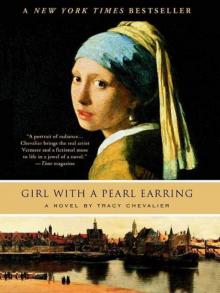 Girl With a Pearl Earring
Girl With a Pearl Earring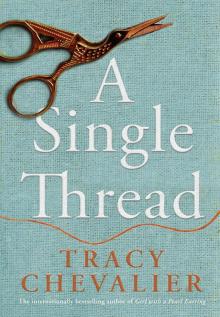 A Single Thread
A Single Thread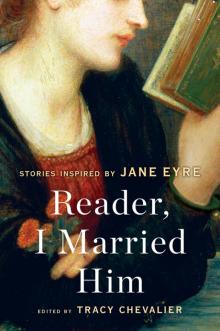 Reader, I Married Him: Stories Inspired by Jane Eyre
Reader, I Married Him: Stories Inspired by Jane Eyre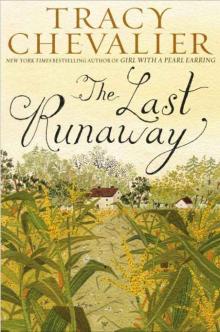 The Last Runaway
The Last Runaway Burning Bright
Burning Bright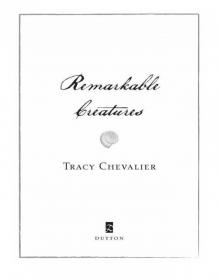 Remarkable Creatures
Remarkable Creatures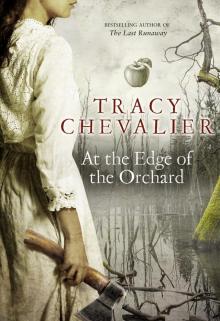 At the Edge of the Orchard
At the Edge of the Orchard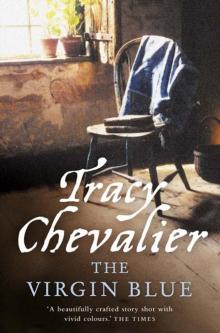 The Virgin Blue
The Virgin Blue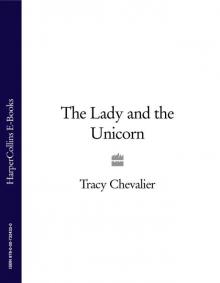 The Lady and the Unicorn
The Lady and the Unicorn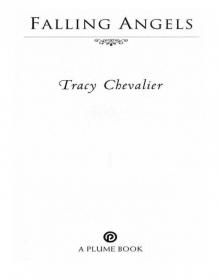 Falling Angels
Falling Angels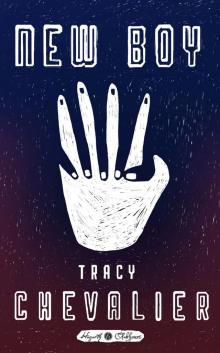 New Boy
New Boy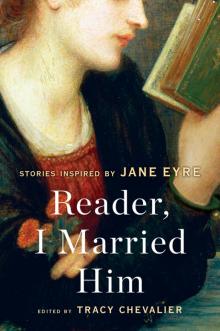 Reader, I Married Him
Reader, I Married Him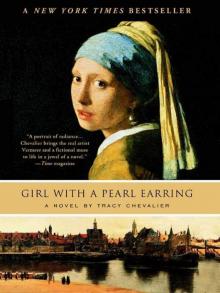 Girl with a Pearl Earring, The
Girl with a Pearl Earring, The